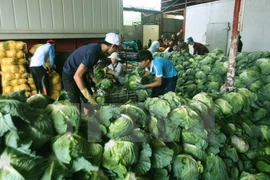The cars will show the results on the spot. Food products contaminated withchemicals will be seized immediately, which will make the public aware that theGovernment is serious about food safety, Chung said.
One car is being used by Hanoi’s Department of Agriculture and RuralDevelopment. Two cars are currently managed by the local Health Department,while two others are under the management of the city’s Department of Industryand Trade.
According to Chung, Hanoi this year has continued to develop safe food supplyand production chains.
The city currently has 60 food chains involved in production, processing anddistribution and has worked with other localities in managing safe food chains,such as VietGAP vegetables of Hoa Binh province, Biggreen, Fivimartsupermarkets of Son La province and DaBaCo chicken of Bac Ninh province.
The city aims to step up food-quality management in markets and small-scaleslaughter houses and will consider eliminating temporary markets.
Chung said in 2018, every commune in the city will have a public servant incharge of food safety. He also said many challenges remained in the fightagainst contaminated food.
People involved in food production and business put profit as their toppriority so they fail to follow food safety regulations and lack theresponsibility for ensuring community health. Consumers, meanwhile, continue topurchase food without clear origins, Chung said.
Last year, Hanoi deployed three cars to check food quality on the spot. Morethan 1,100 food samples were checked, of which 85 were found to containchemicals and prohibited substances.
Inter-sector food inspection teams conducted tests at more than 111,100facilities and found over 26,300 violations.-VNA






























